Affordable Health Insurance Options to Save in 2025
- dustinjohnson5
- Apr 22, 2025
- 22 min read
Finding the Right Health Plan for Your Needs
This guide outlines 10 affordable health insurance options designed for conservative American families, individuals approaching retirement, and budget-minded shoppers. You'll get a clear overview of plans from providers such as America First Financial, Blue Cross Blue Shield, Kaiser Permanente, UnitedHealthcare, and more. Each option offers a balance of coverage and cost efficiency, tackling the challenge of finding quality care without overspending. By reviewing these tools, you can quickly compare benefits and determine which affordable health insurance options best match your unique needs in 2025.
1. America First Financial
America First Financial presents a distinctive approach to insurance, catering specifically to conservative and patriotic Americans seeking affordable health insurance options. This provider prioritizes quality coverage without what they describe as the political agendas found in some mainstream insurance companies. They offer a range of financial products, including term life insurance, disability insurance, annuities, long-term care, and comprehensive health care plans, all designed to align with traditional values and prioritize family protection. This focus makes them a potentially attractive choice for those seeking affordable health insurance options that reflect their personal values.
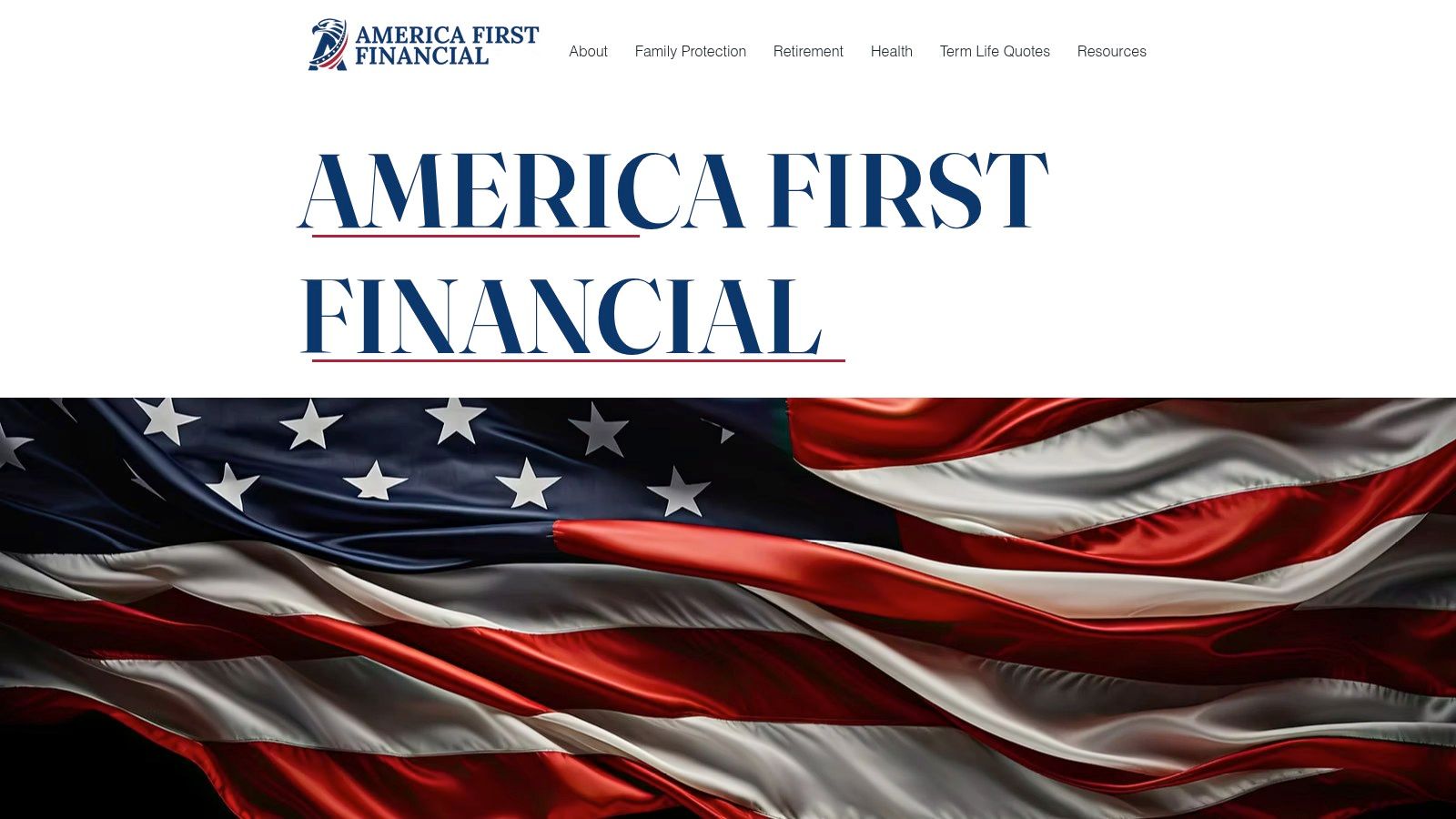
One of America First Financial's standout features is its streamlined online quote system. In under three minutes, potential customers can receive tailored insurance quotes, simplifying the often complex process of comparing health insurance options. This quick and easy process is particularly beneficial for busy families and individuals approaching retirement who are looking for efficient solutions. While specific pricing details aren't readily available without going through the quote process, the company emphasizes affordability as a core principle. This commitment to cost-effectiveness, coupled with their stated dedication to traditional values, makes them a noteworthy option for budget-minded insurance shoppers.
For those seeking a financial partner that shares their conservative values, America First Financial offers a compelling proposition. Their emphasis on family protection, retirement security, and overall health resonates with many conservative American families. Furthermore, the company's philanthropic efforts, contributing to various causes with every dollar earned, may appeal to those seeking to align their financial decisions with their values. While the company’s website and marketing materials feature endorsements from influential figures, it's always advisable to conduct your own research and compare quotes from multiple providers before making a final decision.
Pros:
Quick online quote system with results in less than 3 minutes
Tailored insurance solutions designed for conservative and patriotic Americans
Comprehensive coverage options including term life, disability, annuities, long-term care, and health plans
Affordability combined with a commitment to traditional values and family protection
Endorsements from notable figures
Cons:
Focus on conservative values may not appeal to all consumers
Limited appeal for those seeking a politically neutral or progressive insurance provider
America First Financial earns its place on this list by addressing a specific niche within the affordable health insurance market. By focusing on conservative values and family protection, they provide a tailored service that resonates with a particular demographic. While their politically charged branding may not appeal to everyone, their streamlined quote process and emphasis on affordability make them a viable option for those seeking affordable health insurance options aligned with their values. It's important to remember that finding the right health insurance involves careful consideration of your individual needs and preferences. Comparing quotes and researching multiple providers is crucial before making any final decisions.
2. Blue Cross Blue Shield
Blue Cross Blue Shield (BCBS) stands as a pillar in the American health insurance landscape. For generations, families and individuals have relied on the familiar BCBS logo, and its extensive network continues to make it a relevant choice for affordable health insurance options, particularly for those seeking established, dependable coverage. With a federation of 35 independent companies providing coverage to over 106 million Americans, BCBS offers a variety of plans designed to meet diverse needs and budgets, including HMOs, PPOs, and high-deductible health plans (HDHPs) paired with health savings accounts (HSAs). This breadth of options allows consumers to tailor their coverage to their specific health situations and financial preferences.
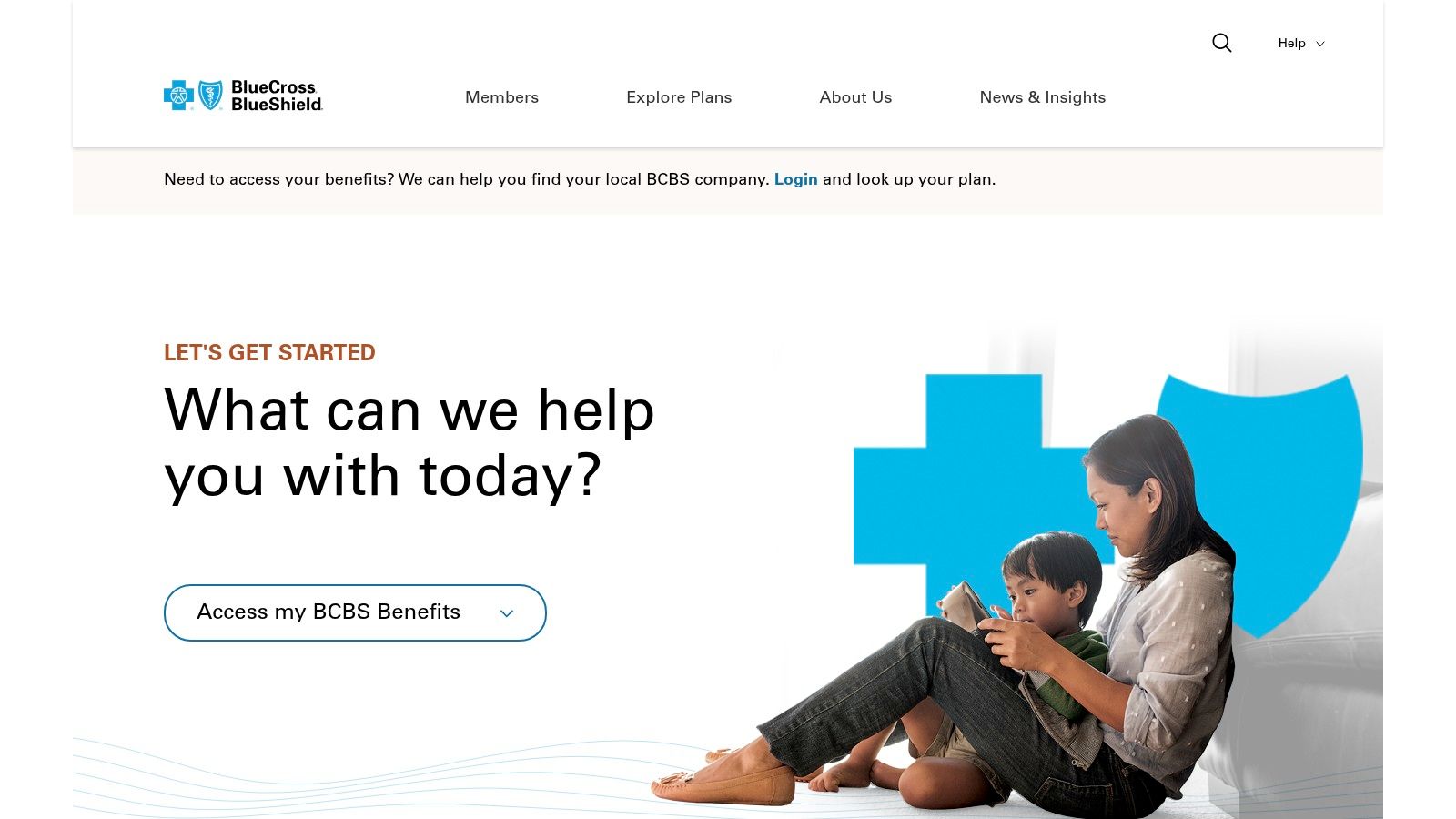
One of the most significant advantages of choosing BCBS is its vast nationwide network. Having access to a wide network of doctors and hospitals across all 50 states provides peace of mind, especially for those who travel frequently or may need to seek specialized care. This expansive network minimizes the likelihood of encountering out-of-network costs and simplifies the process of finding a trusted healthcare provider. For families, knowing they can access reliable care regardless of where they are in the country is a valuable asset. For individuals approaching retirement, this nationwide coverage can be especially important as healthcare needs may evolve and require access to specialists or facilities in different locations.
BCBS offers a range of plan types to cater to different budgetary requirements and healthcare preferences. HMOs provide comprehensive coverage with lower premiums but require members to select a primary care physician (PCP) and obtain referrals for specialist visits. PPOs offer greater flexibility in choosing providers, both in and out-of-network, but often come with higher premiums. High-deductible plans with HSAs are an attractive option for health-conscious consumers and budget-minded shoppers who anticipate lower healthcare utilization and want to save on premiums while building a tax-advantaged health savings account.
Beyond core insurance coverage, BCBS provides additional benefits like the Blue365 discount program, offering savings on health-related products and services, from gym memberships to vision care. The user-friendly mobile app enables members to easily manage claims, find providers, and access telehealth services through MDLive, promoting convenience and proactive health management.
While BCBS offers numerous advantages, it’s important to consider the potential drawbacks. Pricing can be higher compared to some competitors, and coverage details and associated costs vary significantly based on your state and the specific BCBS company operating in that region. It's crucial to compare plans carefully and obtain quotes specific to your location. Customer service experiences can also be inconsistent across regions, reflecting the decentralized nature of the BCBS federation.
Despite these potential cons, BCBS's extensive network, variety of plan options, and strong financial stability make it a prominent contender for individuals and families searching for affordable health insurance options. For those prioritizing a wide network, established reputation, and diverse plan offerings, BCBS deserves serious consideration. You can explore plan options and learn more by visiting their website: https://www.bcbs.com/
3. Kaiser Permanente: An Affordable, Integrated Healthcare Option
Kaiser Permanente stands out as a unique and potentially affordable health insurance option thanks to its integrated healthcare system. Unlike traditional insurance models where the insurer, hospitals, and doctors operate independently, Kaiser Permanente combines all three under one roof. This streamlined approach often translates to lower premiums for its members, making it a worthy contender for those seeking affordable health insurance options, especially conservative American families and individuals approaching retirement on a fixed income. Kaiser Permanente's emphasis on preventive care also appeals to health-conscious consumers who prioritize wellness.
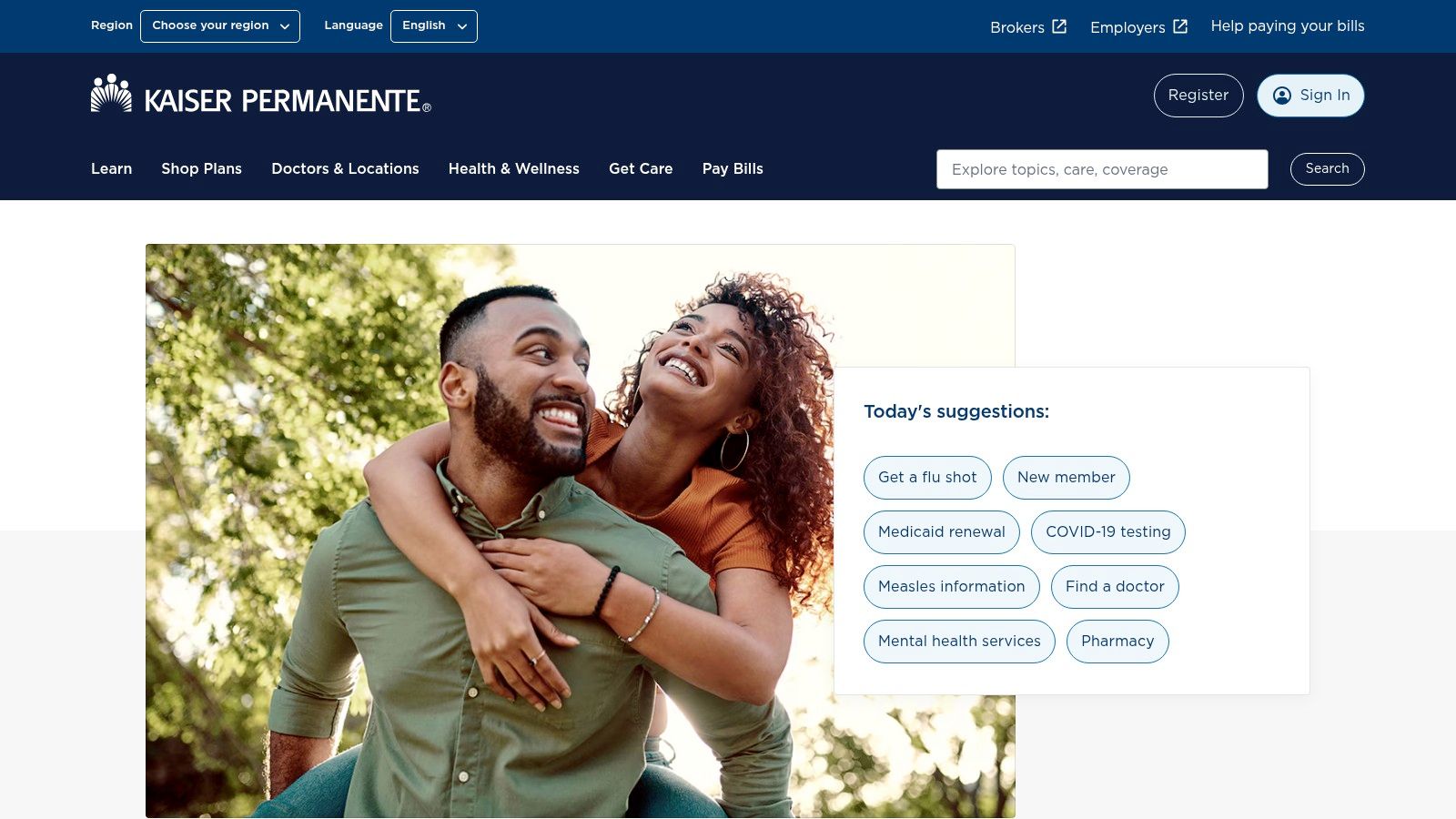
This integrated model allows for coordinated care between doctors and departments, often resulting in a smoother and more efficient experience for patients. Imagine needing to see a specialist – within the Kaiser system, your primary care physician can easily refer you and your medical records are readily accessible to the specialist, eliminating unnecessary paperwork and potential delays. Most services are conveniently available under one roof at Kaiser facilities, further streamlining the healthcare process. This streamlined approach can be particularly beneficial for budget-minded insurance shoppers looking for efficient, cost-effective care, and for patriotic individuals who value American institutions providing comprehensive services. Kaiser Permanente serves over 12 million members across eight states and Washington D.C., demonstrating its established presence and commitment to serving its communities.
Kaiser Permanente's strong focus on preventive care and wellness programs offers significant advantages. Many plans cover preventive services, like annual checkups and vaccinations, with no copay. This proactive approach can help catch potential health issues early and contribute to better long-term health outcomes. Further supporting their focus on wellness, Kaiser Permanente offers comprehensive digital tools, including a 24/7 nurse advice line for immediate medical guidance and video visits for convenient access to care, particularly useful for those with busy schedules or limited mobility. A mail-order pharmacy with home delivery options adds to the convenience and accessibility.
While Kaiser Permanente offers several advantages, it's essential to be aware of its limitations. The most significant drawback is its limited geographic availability. If you live outside of the eight states and Washington D.C. they serve, Kaiser Permanente isn't an option. Additionally, members typically must use Kaiser facilities and doctors, which can be a constraint for those who prefer a broader choice of providers or who travel frequently outside of Kaiser’s service areas. Obtaining care while traveling can be more challenging, requiring pre-authorization and potentially incurring higher out-of-pocket costs.
Despite these limitations, Kaiser Permanente offers a compelling model for affordable health insurance options. The integrated system, emphasis on preventive care, and comprehensive digital tools contribute to a potentially lower cost and more streamlined healthcare experience. If you reside within their service area and value coordinated care, Kaiser Permanente is definitely worth considering. Visit their website at https://healthy.kaiserpermanente.org/ to explore plans and learn more.
4. UnitedHealthcare: A Familiar Name in Affordable Health Insurance Options
UnitedHealthcare, a cornerstone of the American healthcare landscape, stands as the largest health insurance provider in the United States, covering approximately 70 million people. For conservative American families, individuals approaching retirement, and budget-minded insurance shoppers seeking affordable health insurance options, UnitedHealthcare offers a variety of plans worth considering. Their extensive network and commitment to digital tools make them a particularly appealing choice for those valuing accessibility and convenience.
As part of UnitedHealth Group, UnitedHealthcare offers a wide range of health insurance plans designed to meet diverse needs and budgets. Whether you're looking for coverage for yourself, your family, or your business, they offer options including HMOs, PPOs, EPOs, and high-deductible health plans (HDHPs) paired with Health Savings Accounts (HSAs). This variety is key when seeking affordable health insurance options, allowing you to tailor coverage to your specific health and financial situation. For example, a young, healthy individual might find an HDHP appealing for its lower premiums, while a family with anticipated higher medical expenses might prefer a PPO for its greater flexibility.
One of UnitedHealthcare's most significant strengths lies in its nationwide coverage and extensive provider network. This is particularly reassuring for those who value choice and access to quality care, especially individuals approaching retirement who may require specialized medical services. Finding a doctor within your network is generally straightforward, reducing the hassle and potential out-of-pocket expenses associated with out-of-network care.
UnitedHealthcare also embraces technology with innovative digital tools, including the user-friendly UnitedHealthcare app. This app empowers you to manage your healthcare efficiently, from finding a doctor and reviewing claims to accessing virtual visits, often with no copay. This focus on digital convenience is especially valuable for busy families and tech-savvy consumers. Their wellness programs and incentives through Rally Health further demonstrate their commitment to preventative care and overall well-being, an important factor for health-conscious individuals. These programs can offer personalized support and rewards for healthy habits, potentially leading to lower healthcare costs in the long run.
Features:
Extensive nationwide provider network
Virtual visits with no copay on many plans
Wellness programs and incentives through Rally Health
Innovative digital tools, including the UnitedHealthcare app
Additional benefits like dental, vision, and pharmacy coverage options
Pros:
One of the largest provider networks in the US, offering broad access to care.
Multiple plan options at different price points, allowing for budget customization.
Strong digital presence with useful online tools and resources, simplifying healthcare management.
Many plans include additional wellness benefits and discounts, promoting proactive health management.
Cons:
Premium costs for some plans can be higher than competitors, requiring careful budget consideration.
Some members have reported customer service issues, which is a potential concern.
Prior authorization requirements for certain procedures can sometimes delay necessary care, a factor to keep in mind.
Website: https://www.uhc.com/
While pricing details vary based on plan type, location, and individual circumstances, UnitedHealthcare aims to provide affordable health insurance options across its range of offerings. It's important to compare plans and utilize their online tools or consult with a representative to find the best fit for your needs and budget. While potential customer service issues and prior authorization requirements are factors to consider, the extensive provider network, robust digital tools, and focus on wellness make UnitedHealthcare a strong contender for individuals and families seeking reliable and accessible healthcare coverage. For those seeking affordable health insurance options, UnitedHealthcare is undoubtedly a provider worth investigating.
5. Medicaid: Affordable Healthcare for Qualifying Individuals and Families
Medicaid stands as a crucial safety net, providing affordable health insurance options for millions of Americans. As a joint federal and state government program, Medicaid offers free or very low-cost health coverage to eligible low-income adults, children, pregnant women, elderly adults, and people with disabilities. This makes it an invaluable resource for those struggling to afford private insurance, especially conservative American families, individuals approaching retirement, and budget-minded insurance shoppers looking for financial stability and peace of mind.
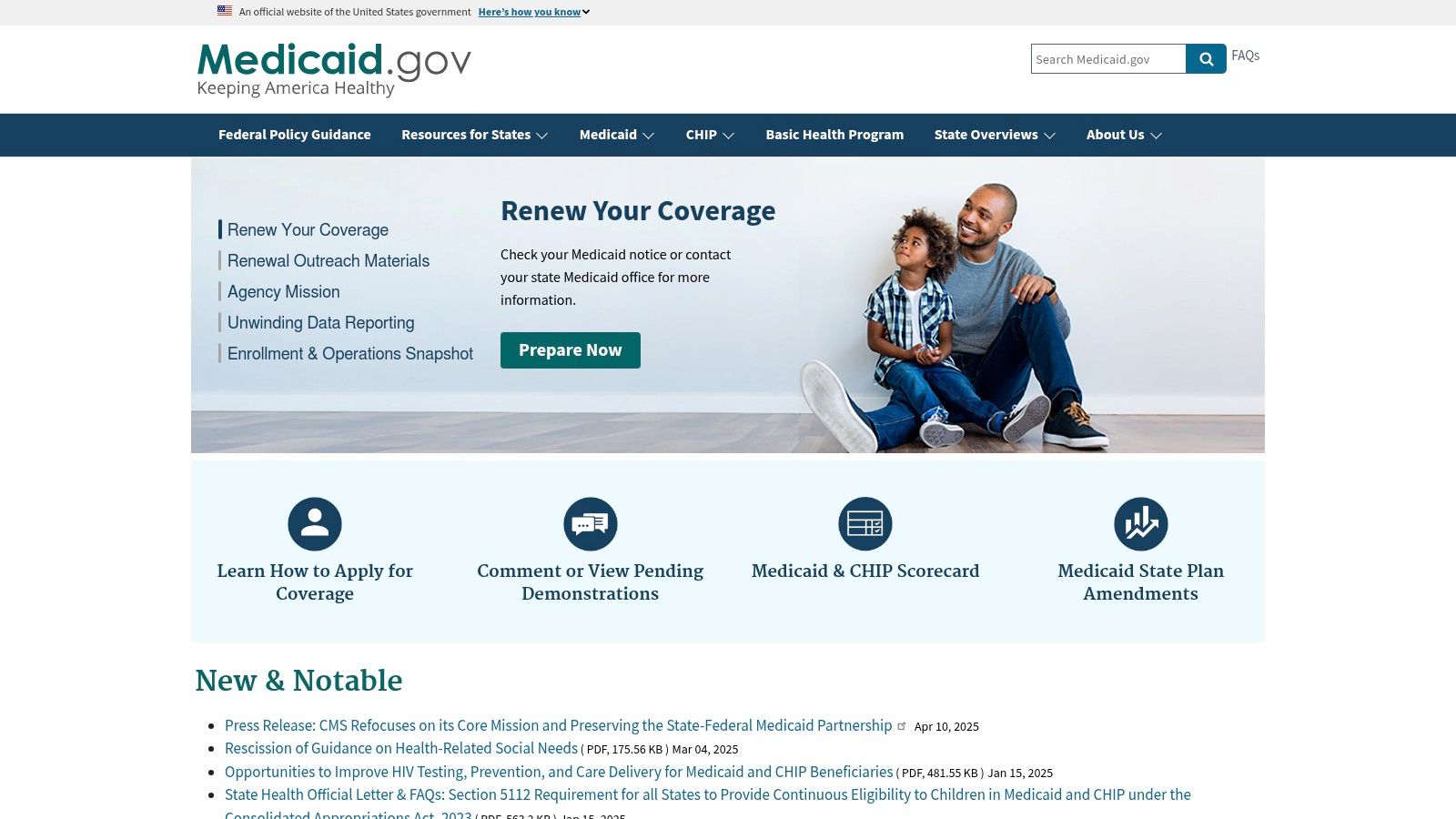
Medicaid's comprehensive benefits generally cover essential health services, making it a robust and affordable health insurance option. These benefits typically include doctor visits, hospital care, and prescription drugs, often with minimal to no out-of-pocket expenses. This can be particularly beneficial for individuals approaching retirement who may be facing increasing healthcare costs and those on a fixed income. Furthermore, Medicaid often extends coverage to pregnant women and children even at higher income levels than other demographics, providing essential support for growing families. Unlike marketplace health plans, there are no enrollment period restrictions for Medicaid; eligible individuals can apply at any time of year. Retroactive coverage is also a significant advantage, potentially covering medical expenses for up to three months prior to the application date, providing a valuable safety net in case of unforeseen medical emergencies.
For qualifying individuals, Medicaid offers several key advantages. The extremely low premiums and minimal out-of-pocket costs mean substantial savings on healthcare expenses, allowing families to allocate their budgets towards other essential needs. Medicaid's comprehensive coverage often includes services not typically covered by private insurance, such as dental, vision, and long-term care services, depending on the state. Importantly, Medicaid does not exclude coverage based on pre-existing conditions, ensuring that individuals with pre-existing health concerns can access necessary medical care.
However, it's important to be aware of the program's requirements and limitations. Medicaid has strict income and asset eligibility requirements, which vary by state. This can mean that some individuals and families, even those with limited resources, may not qualify. Additionally, not all healthcare providers accept Medicaid, which can sometimes limit the choice of doctors and hospitals. The variability of benefits and eligibility across different states can also create complexities, requiring potential applicants to carefully research their state's specific guidelines.
To determine your eligibility and apply for Medicaid, visit the official Medicaid website: https://www.medicaid.gov/. This resource provides comprehensive information about the program, state-specific guidelines, and application procedures. For those who qualify, Medicaid provides a vital pathway to affordable and comprehensive healthcare, contributing to the well-being of individuals, families, and communities across the nation. Its focus on accessible healthcare makes it a particularly valuable resource for those prioritizing health and financial well-being.
6. Cigna: A Global Health Insurance Option for the Whole Family
Cigna is a well-established global health services company offering a variety of affordable health insurance options suitable for individuals, families, and employers. If you're looking for comprehensive coverage, wellness programs, and a range of plan types, Cigna could be a good fit, especially for those approaching retirement or families concerned about healthcare costs. Their offerings include HMOs, PPOs, and high-deductible plans paired with Health Savings Accounts (HSAs), catering to diverse needs and budgets. This makes them a worthy contender on our list of affordable health insurance options.
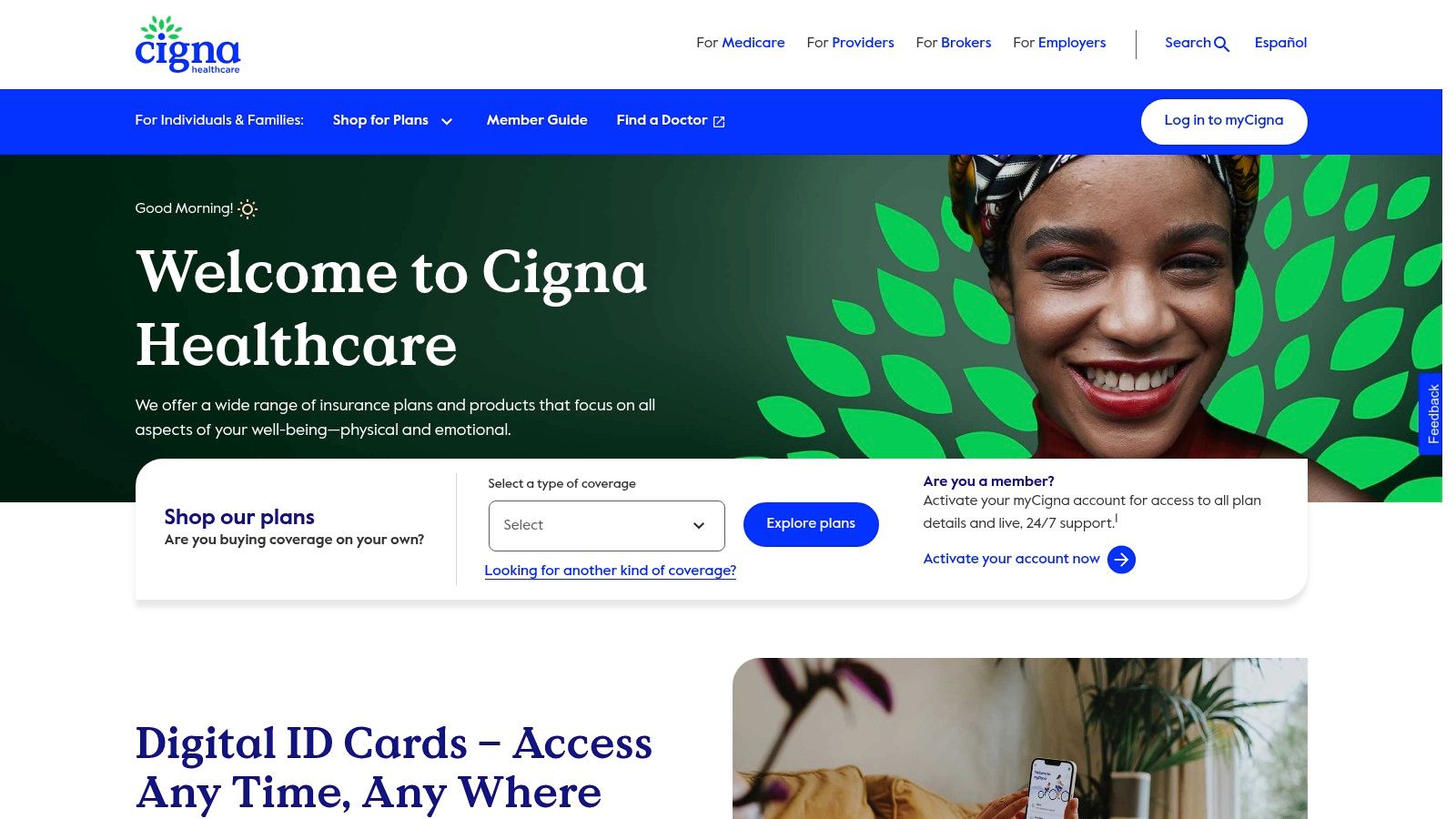
Cigna's extensive network includes over 1.5 million healthcare providers and facilities, giving you access to a wide range of doctors and specialists. For the budget-minded, Cigna's emphasis on preventative care and wellness programs, combined with their prescription savings options, can help manage healthcare expenses. This is particularly relevant for conservative American families and health-conscious consumers seeking value and cost-effectiveness in their insurance plans.
Key Features and Benefits:
Telehealth Services: Cigna offers telehealth services through MDLIVE, often with a $0 copay on many plans. This provides a convenient and affordable way to access medical consultations from the comfort of your home, potentially saving time and travel costs.
Prescription Savings: Cigna's Home Delivery Pharmacy for maintenance medications can be a significant advantage for individuals taking regular prescriptions, offering convenience and potential cost savings.
24/7 Health Information Line: Access to nurses 24/7 via their Health Information Line provides peace of mind and immediate support for health concerns.
Digital Tools: The myCigna digital platform and mobile app allow you to easily manage your health benefits, claims, and find in-network providers. This feature is essential for those who appreciate user-friendly technology and prefer to manage their health information online.
Healthy Rewards: Cigna's Healthy Rewards discount program offers savings on fitness programs, nutritional products, and other wellness resources, encouraging proactive health management.
International Coverage: For individuals and families who travel frequently, Cigna's robust international coverage options are a major advantage, offering peace of mind while abroad. This may be particularly appealing to patriotic individuals who may work or volunteer overseas.
Pros:
Strong international coverage.
Comprehensive wellness programs and health coaching.
User-friendly digital tools and mobile app.
Pharmacy benefits management through Express Scripts.
Cons:
Network coverage can be limited in certain regions. Be sure to check provider availability in your area.
Premiums on some plans can be higher compared to competitors. Comparing quotes from different insurers is crucial to finding affordable health insurance options.
Customer service experiences can be inconsistent.
Pricing: Cigna's plan pricing varies depending on factors such as location, age, coverage level, and deductible. Visit their website to get a personalized quote and compare affordable health insurance options that suit your specific needs and budget.
Implementation/Setup Tips: The Cigna website (https://www.cigna.com/) provides resources and tools to help you choose a plan and enroll. You can also contact their customer service for assistance.
Cigna’s combination of comprehensive coverage, wellness programs, and digital tools make it a valuable option to explore when searching for affordable health insurance options. While potential network limitations and premium costs are factors to consider, their focus on preventative care and overall wellness may be particularly appealing to certain individuals and families. Comparing Cigna’s offerings with other insurers in your area is crucial for finding the best fit for your specific healthcare needs and budget.
7. Marketplace Plans (Healthcare.gov)
Finding affordable health insurance can feel like navigating a maze, especially for families, those approaching retirement, or anyone on a budget. Marketplace plans, available through Healthcare.gov, offer a potential solution by providing access to qualified health plans with standardized benefits and cost assistance for those who qualify. This makes them a worthwhile consideration for anyone seeking affordable health insurance options. These plans can be especially valuable for conservative American families who value self-reliance but also need access to reliable and affordable healthcare. For health-conscious consumers and those approaching retirement, having a clear understanding of coverage options and associated costs is paramount.

Marketplace plans are organized into four metallic tiers – Bronze, Silver, Gold, and Platinum – reflecting the level of cost-sharing. Bronze plans have the lowest monthly premiums but higher out-of-pocket costs when you need care, while Platinum plans have the highest premiums and lower out-of-pocket expenses. All plans cover essential health benefits, ensuring you're protected for services like preventive care, emergency services, hospitalization, prescription drugs, maternity care, and mental health services. This standardization simplifies comparison shopping, a key advantage for budget-minded insurance shoppers. It levels the playing field and allows you to focus on the coverage and cost that best fit your needs and budget, not decipher complex policy jargon.
One of the most significant advantages of Marketplace plans is the potential for financial assistance. Income-based premium tax credits can lower your monthly payments, making coverage more affordable. Additionally, cost-sharing reductions are available for eligible individuals who choose Silver plans, further reducing out-of-pocket expenses like co-pays and deductibles. This financial assistance can be a lifeline for families and individuals who might otherwise struggle to afford quality health insurance. This aligns with the values of many patriotic individuals who believe in a safety net for those who need it.
Features and Benefits:
Income-based premium tax credits: Lower your monthly premiums.
Cost-sharing reductions: Reduce out-of-pocket expenses for those eligible.
Standardized coverage of essential health benefits: Ensures consistent coverage across all plans.
Guaranteed coverage regardless of health status: Pre-existing conditions are covered.
Side-by-side comparison tools: Simplify plan selection.
Pros:
Financial assistance available: Makes health insurance more accessible.
Guaranteed coverage: Peace of mind knowing you’re covered.
Standardized benefits: Easier to compare plans.
Annual open enrollment period & special enrollment periods: Flexibility for life changes.
Cons:
Limited enrollment periods: May need to wait for open enrollment or a qualifying event.
Plans can be expensive without subsidies: Costs can be high if you don't qualify for financial assistance.
Network options may be narrower: Fewer provider choices compared to some employer plans.
Implementation/Setup Tips:
Applying for Marketplace coverage is done online through Healthcare.gov. During the annual open enrollment period, you can browse plans, compare costs, and apply for coverage. Be prepared to provide information about your income, household size, and current health insurance status. It's advisable to gather necessary documents like tax returns and proof of residency beforehand to streamline the application process.
Comparison:
While employer-sponsored insurance is another common option, Marketplace plans provide an alternative, especially for those who are self-employed, work part-time, or don't have access to employer-sponsored coverage. Marketplace plans offer a safety net, guaranteeing access to essential health benefits regardless of employment status.
8. Aetna (CVS Health)
Aetna, now a CVS Health company, stands as a prominent option for individuals and families seeking affordable health insurance options. With a rich history and a vast network, Aetna offers a variety of plans designed to meet diverse needs and budgets. Whether you're a young family just starting out, approaching retirement, or simply looking for cost-effective coverage, Aetna's range of plans, including individual and family plans, Medicare plans, and employer-sponsored coverage, may hold the right solution for you. Their extensive network encompasses over 1.2 million healthcare professionals and more than 5,700 hospitals, providing access to quality care across the nation. This makes Aetna particularly appealing to those who value choice and flexibility in their healthcare providers.
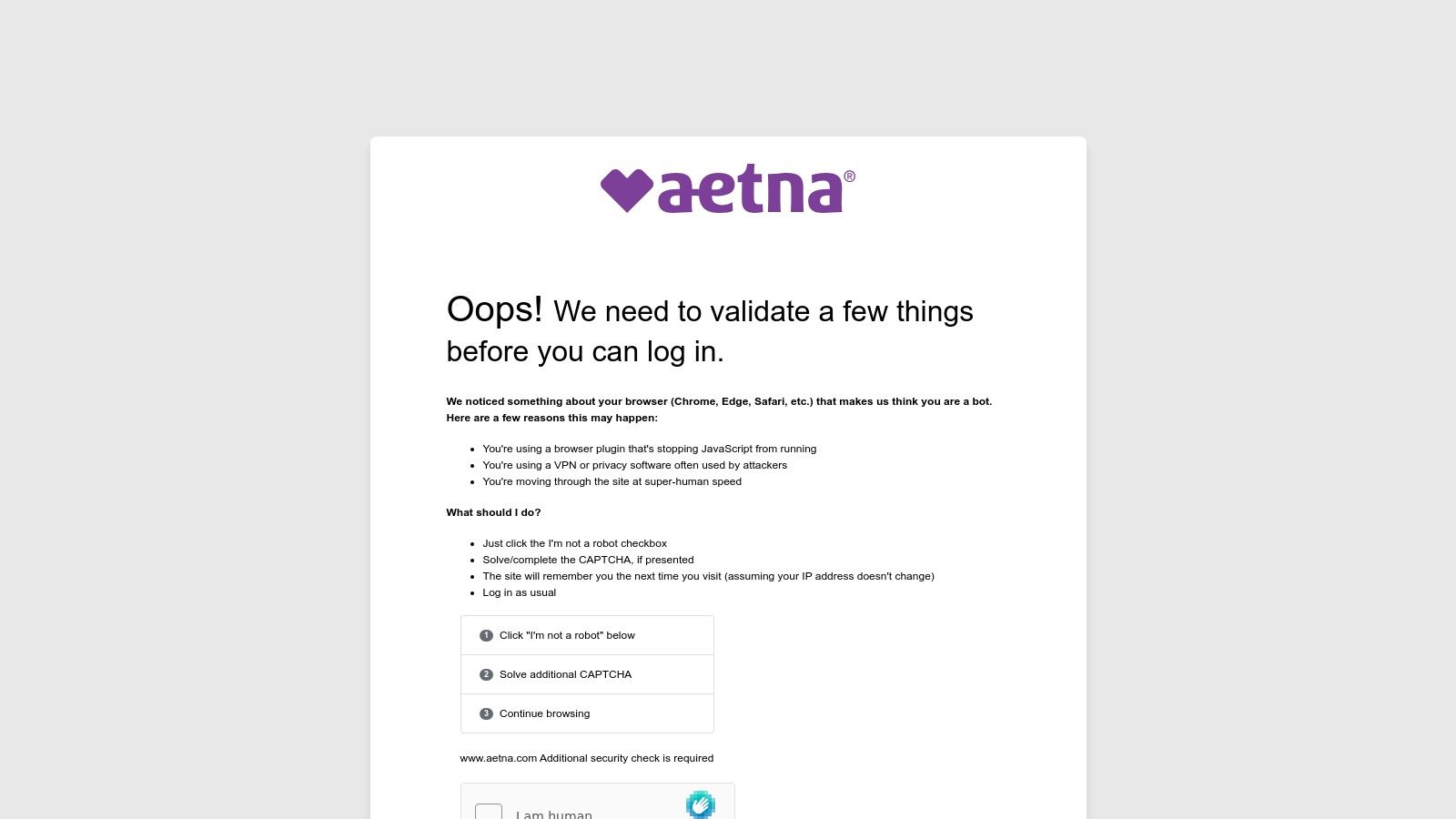
Aetna offers a comprehensive suite of plan types, including HMOs, PPOs, EPOs, and high-deductible health plans paired with Health Savings Accounts (HSAs). This variety allows you to tailor your coverage to your specific health needs and financial situation. For the budget-minded consumer, high-deductible plans can offer lower premiums, while those seeking greater flexibility may prefer a PPO. Aetna’s emphasis on preventive care and wellness programs further underscores its commitment to helping members maintain optimal health, a crucial consideration for health-conscious individuals. These programs can empower you to take control of your health and potentially lower your long-term healthcare costs.
A key advantage of choosing Aetna is its seamless integration with CVS Health resources. This synergy provides convenient access to CVS MinuteClinic and HealthHUB locations for routine checkups, vaccinations, and minor illnesses. Think of it as a one-stop shop for many of your healthcare needs. Furthermore, Aetna’s strong digital presence shines through its user-friendly Aetna Health app, which allows you to manage your plan, find doctors, and access virtual care. Teladoc telehealth services, available on most plans, offer added convenience and accessibility, especially for families with busy schedules or those living in rural areas. These telehealth options resonate well with the increasing demand for remote healthcare solutions.
Aetna’s commitment to member well-being is reinforced by the Aetna Healthy Rewards program, offering incentives for healthy behaviors. Personalized health and wellness programs provide tailored support and resources to help you achieve your individual health goals. These features are especially attractive to health-conscious consumers and those approaching retirement who are prioritizing their long-term well-being.
Pros:
Extensive Nationwide Network: Access to a large network of providers and hospitals offers flexibility and choice.
CVS Integration: Convenient access to CVS pharmacies and clinics simplifies healthcare management.
Robust Digital Tools: User-friendly app and telehealth services enhance convenience and accessibility.
Varied Plan Options: A range of plans caters to different budgets and healthcare needs.
Cons:
Limited Marketplace Availability: Individual marketplace plans may not be available in all areas.
Deductible Variations: Some plans may have higher deductibles, requiring careful consideration of out-of-pocket costs.
Customer Service: Customer service responsiveness can sometimes vary.
Website: https://www.aetna.com/
Aetna earns its place on this list by offering a compelling blend of affordability, comprehensive coverage, and convenient access to care. While individual marketplace availability is a factor to consider depending on your location, the breadth of plan options, coupled with the robust CVS Health integration, makes Aetna a strong contender for individuals, families, and those approaching retirement who prioritize value and accessibility in their affordable health insurance options.
9. Ambetter: Affordable Health Insurance Focused on Value
Ambetter, offered by Centene Corporation, is a strong contender for those seeking affordable health insurance options, particularly individuals and families navigating the Marketplace. Their focus on value and accessibility makes them a practical choice for budget-minded consumers. Ambetter offers plans in over 20 states, catering specifically to those looking for cost-effective coverage. This makes them a valuable option for individuals approaching retirement on a fixed income or families prioritizing their budget. Their plans are structured within the familiar metallic tiers (Bronze, Silver, and Gold), allowing you to choose a plan that aligns with your anticipated healthcare needs and budget. Many Ambetter members also qualify for premium subsidies through the Marketplace, further enhancing affordability. This can be particularly helpful for conservative American families who value self-reliance but also appreciate assistance when it comes to managing healthcare costs.

Ambetter recognizes the importance of preventive care and encourages healthy lifestyles through its My Health Pays rewards program. This program offers financial incentives for engaging in health-conscious activities, resonating with health-conscious consumers. Think of it as a reward for taking charge of your well-being. They also offer telehealth services through Teladoc, a 24/7 nurse advice line, an online member portal, a mobile app, and prescription coverage with mail-order options. These convenient features provide accessible healthcare management tools that fit seamlessly into busy lives.
While Ambetter excels in affordability, it's crucial to be aware of some potential limitations. Their provider networks are generally narrower than larger, more established insurers. This means you'll need to verify that your preferred doctors and hospitals are in-network before enrolling. The limited state availability is also a factor; Ambetter may not be an option if you reside outside their covered areas. Finally, while Ambetter strives to provide quality customer service, they have received more frequent complaints compared to some larger insurers.
Features and Benefits Recap:
My Health Pays: Earn rewards for healthy activities, promoting proactive healthcare management.
Telehealth Services: Access convenient virtual care through Teladoc.
24/7 Nurse Advice Line: Get immediate medical advice and support around the clock.
Online Portal and Mobile App: Manage your health information and claims efficiently.
Prescription Coverage: Includes mail-order options for added convenience.
Pros:
Affordability: Often among the most budget-friendly Marketplace plans.
Subsidy Eligibility: Many members qualify for premium subsidies.
Rewards Program: Incentives for healthy behaviors.
Pre-existing Conditions Coverage: Guaranteed coverage regardless of pre-existing health conditions.
Cons:
Narrower Networks: Provider options may be more limited compared to competitors.
Limited Availability: Plans are not available in all states.
Customer Service: Some reports of lower customer service satisfaction compared to larger insurers.
If you're seeking an affordable health insurance option and prioritize value, Ambetter is certainly worth considering. Visit their website at https://www.ambetterhealth.com/ to explore plan options and see if Ambetter is the right fit for you. Be sure to carefully review the provider network and consider the customer service feedback when making your decision.
10. Oscar Health: A Tech-Savvy Approach to Affordable Health Insurance Options
Oscar Health distinguishes itself in the crowded health insurance marketplace with its focus on technology and user-friendly tools. This makes it a potentially appealing choice for those seeking affordable health insurance options, particularly individuals and families comfortable navigating healthcare through digital platforms. For conservative American families, the emphasis on individual responsibility and clear, transparent pricing can be particularly attractive. Individuals approaching retirement will appreciate the streamlined app interface and the assistance provided by the concierge team in navigating the complexities of healthcare. Health-conscious consumers will find value in the preventative care focus through the virtual primary care offerings. Finally, for budget-minded shoppers, Oscar Health’s commitment to affordable options and clear pricing makes it a worthwhile contender.
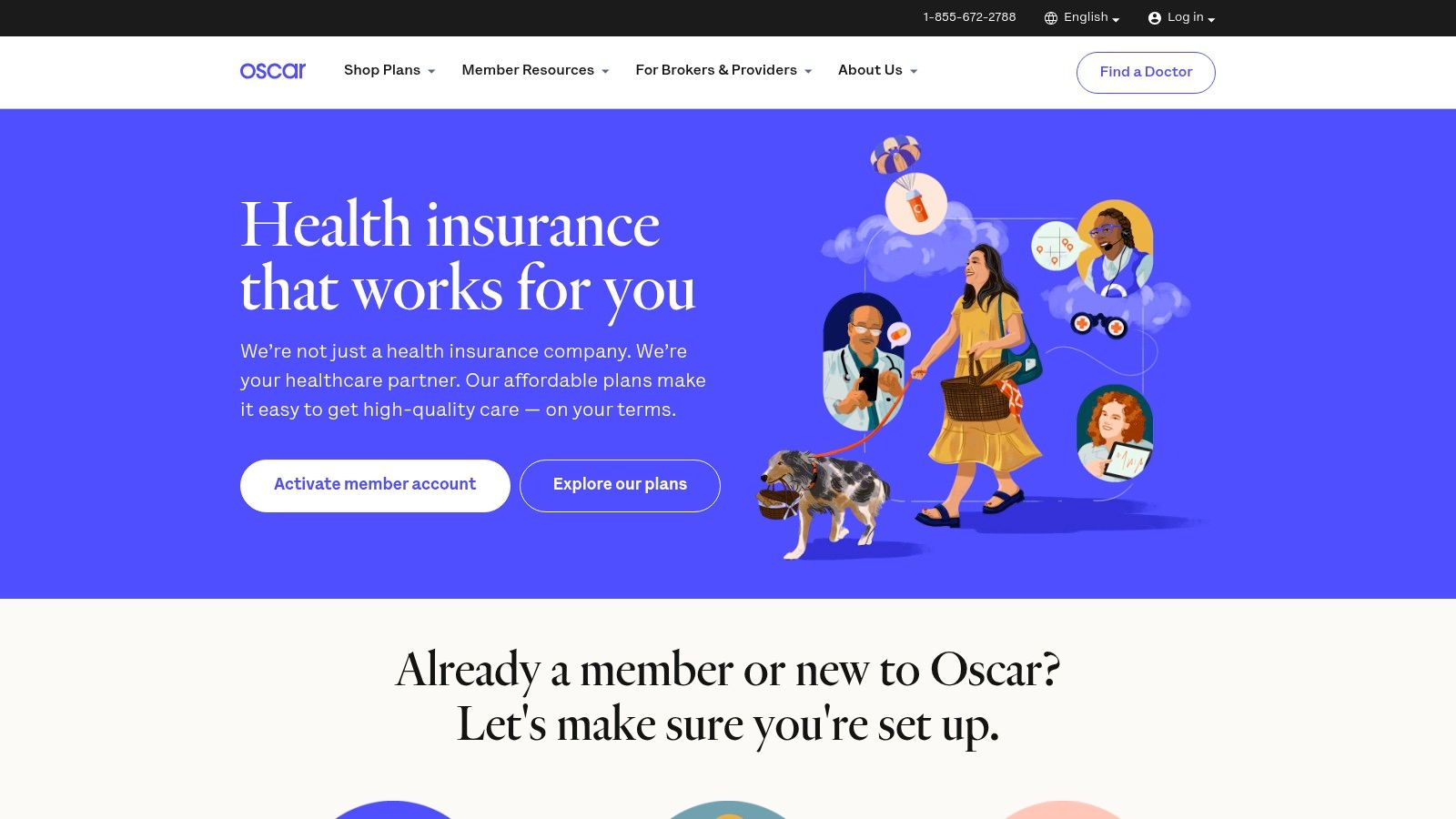
Oscar Health offers individual, family, and small business plans, available through the Marketplace and via direct enrollment, although its availability is limited to certain states. This limitation in geographic availability is a crucial factor to consider when evaluating Oscar Health as a potential insurer. Before getting invested in the platform's modern approach, verify its availability in your area.
A cornerstone of Oscar Health's offering is its emphasis on virtual care. Many plans include unlimited virtual primary care visits at no additional cost, potentially saving you time and money compared to traditional in-person doctor visits. This feature can be particularly beneficial for routine checkups, prescription refills, and managing chronic conditions. Imagine having access to a doctor 24/7 from the comfort of your home – a significant advantage for busy families and individuals nearing retirement who may have limited mobility. Beyond primary care, Oscar provides care routing and concierge teams to help members navigate the healthcare system, a valuable service for those unfamiliar with insurance complexities. Their user-friendly mobile app further simplifies managing benefits, finding providers, and tracking claims. As an added incentive, their step-tracking rewards program offers Amazon gift cards, encouraging a proactive approach to health and wellness, appealing to health-conscious consumers.
While Oscar Health presents a refreshing take on health insurance, it's essential to be aware of its limitations. Besides the restricted geographic availability, Oscar Health’s provider networks are typically smaller than those of long-established insurance giants. This could mean fewer choices for specialists and hospitals, especially in rural areas. They also offer fewer plan options compared to larger competitors, potentially limiting customization to your specific needs. Being a relatively new company, Oscar Health has a shorter track record compared to industry veterans.
Here’s a summary of the pros and cons:
Pros:
Modern, technology-driven approach to health insurance.
Free 24/7 telemedicine services for primary care on most plans.
Transparent pricing and easy-to-understand benefits.
Dedicated care teams to assist with navigating the healthcare system.
Step-tracking rewards program with Amazon gift card incentives.
Cons:
Limited geographic availability.
Smaller provider networks than established insurers.
Fewer plan options compared to larger competitors.
Relatively new company with less established track record.
For those prioritizing a modern, tech-forward experience and valuing virtual care options, Oscar Health presents a compelling alternative within the affordable health insurance landscape. If you're tech-savvy, appreciate simplified healthcare management, and live within their service area, it's worth exploring their offerings. You can find more information and check availability on their website: https://www.hioscar.com/
Top 10 Affordable Health Insurance Options Comparison
Provider | Core Features ✨ | User Experience ★ | Value Proposition 💰 | Target Audience 👥 |
|---|---|---|---|---|
🏆 America First Financial | Tailored insurance; term life, disability, annuities, long-term care, health care | Quick online quotes (<3 min), hassle-free sign-up | Affordable, quality coverage with philanthropic support | Conservative & Patriotic Americans |
Blue Cross Blue Shield | Nationwide network; HMOs, PPOs, Blue365 discounts | User-friendly app; telehealth via MDLive | Comprehensive plans with strong financial stability | Broad demographic across all 50 states |
Kaiser Permanente | Integrated care system; hospitals & preventive focus | Excellent digital tools & 24/7 telehealth | Lower out-of-pocket costs; coordinated care | Residents in 8 states & Washington, D.C. |
UnitedHealthcare | Extensive network; varied plan options (HMO, PPO, etc.) | Strong digital presence; virtual visit options | Diverse plans with additional wellness benefits | Nationwide, catering to various groups |
Medicaid | Government-sponsored; free/low-cost essential coverage | Simple eligibility with retroactive coverage | Minimal premiums, comprehensive basic benefits | Low-income individuals, families, & people with disabilities |
Cigna | Global network; wellness programs, telehealth, supplemental plans | Robust mobile app; digital health tools | Affordable options with health coaching & savings programs | Individuals, families, employers |
Marketplace Plans (Healthcare.gov) | Standardized essential benefits; Bronze to Platinum tiers | Easy side-by-side comparisons & open enrollment | Subsidies and cost-sharing reductions for eligible | Qualified individuals across income levels |
Aetna (CVS Health) | CVS integration; multiple plan types & digital tools | User-friendly interface with access to MinuteClinic | Nationwide network with an emphasis on prevention | Individuals, families, employers |
Ambetter | Marketplace plans with rewards; telehealth services | Online portal & mobile app for easy access | Affordable, subsidy-eligible with a rewards incentive | Individuals & families in select states |
Oscar Health | Tech-driven; unlimited virtual care with concierge support | Modern app interface; transparent pricing tools | Innovative, clear pricing with a digital-first approach | Tech-savvy individuals in select states |
Making an Informed Decision about Your Coverage
Finding affordable health insurance options can feel overwhelming, but by using the tools and resources outlined in this article, you can navigate the process with confidence. We've explored various options, from established providers like Blue Cross Blue Shield, UnitedHealthcare, Cigna, Aetna (CVS Health), and Kaiser Permanente, to newer entrants like Oscar Health and Ambetter. We also looked at Marketplace Plans (Healthcare.gov) and Medicaid, which can be particularly helpful for those approaching retirement or on a tight budget. Remember, the best plan for you depends on your individual needs and budget. Key factors to consider include provider networks, deductibles, co-pays, and out-of-pocket maximums.
When comparing plans, consider which tools offer personalized support and guidance. Some tools might excel at comparing marketplace plans, while others might focus on specific providers or demographic needs. For example, if you're considering Medicaid, the application process can be complex. Applying for Medicaid can be a complex process. For a streamlined experience and to ensure you don't miss out on any potential benefits, consider utilizing resources like applying for Medicaid from Caring Hands Senior Services for fast application assistance and quick approval. This can be especially helpful for families and individuals seeking the most affordable health insurance options.
By carefully comparing these affordable health insurance options and utilizing the right tools, you can secure comprehensive coverage that protects your health and your financial future. Securing the right health insurance is an investment in your well-being and provides peace of mind for you and your family. For personalized guidance navigating these options and finding the best fit for your needs, especially for those seeking a fiscally conservative and America-focused approach, explore the resources available at America First Financial. They can help you compare plans, understand the complexities of the market, and secure the most affordable health insurance for your unique situation.
_edited.png)
Comments